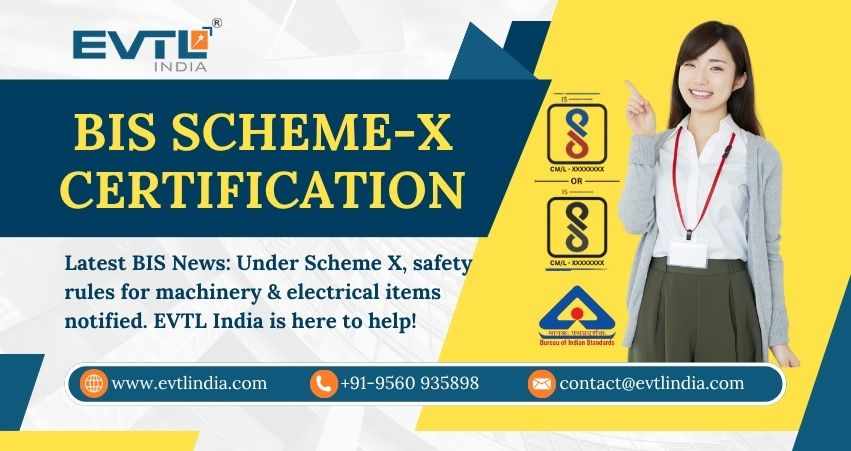
In India, the Bureau of Indian Standards (BIS) ensures that products meet quality and safety benchmarks. One of its major certification routes is Scheme X. Whether you are a manufacturer, importer, or startup planning to launch a product in India, understanding BIS Scheme X is essential. In this blog, we will explain what Scheme X is, why it is important, and how EVTL India can help you get certified easily and effectively.
What is BIS Scheme X?
Scheme X refers to one of the conformity assessment schemes under the BIS Certification framework. Specifically designed for product types that need strict monitoring, it includes factory inspections, product testing, and continuous surveillance. Products under this scheme are typically critical to health, safety, and national standards, hence they require higher levels of scrutiny before receiving certification.
The main objective of BIS Scheme X is to ensure that all products reaching Indian consumers are safe, reliable, and standardized. This scheme includes granting of the ISI mark for products that meet the requirements under Indian Standards.
Who Needs BIS Scheme X Certification?
BIS Scheme X is generally applied to products covered under the Compulsory Certification Order (QCO) issued by the Ministry of Consumer Affairs or other regulatory authorities. Some examples include:
Electrical appliances
Safety-critical mechanical components
Pressure cookers
Building materials
Consumer safety products
If your product falls under the BIS Scheme X QCO, then obtaining certification before selling or importing is mandatory.
What is a QCO under BIS Scheme X?
QCO stands for Quality Control Order. It is a legal notification issued by the government that mandates certain products to comply with specific Indian Standards and get BIS certified under a particular scheme—such as Scheme X.
Under a QCO, manufacturers and importers are required to:
Get their product tested from BIS-approved laboratories
Undergo factory inspection
Obtain the ISI Mark license
Continue with periodic inspections and surveillance
Failing to comply with a QCO may lead to penalties, fines, or a ban on the sale of the product in the Indian market.
Step-by-Step Process for BIS Scheme X Certification
The certification under Scheme X involves the following key steps:
Step 1: Application Submission
The process begins by submitting an online application on the BIS portal along with all required documents such as test reports, product details, and manufacturing unit information.
Step 2: Product Testing
Samples are selected and sent to BIS-recognized laboratories for testing. These tests check if the product meets the applicable Indian Standard.
Step 3: Factory Audit
BIS officials visit the manufacturing premises to evaluate the production process, quality control systems, and testing facilities.
Step 4: Review and Approval
Once both the testing and inspection reports are satisfactory, BIS reviews the application and grants the ISI certification license under Scheme X.
Step 5: Marking and Surveillance
After certification, the manufacturer must affix the ISI mark on the product and packaging. BIS will also conduct periodic surveillance audits to ensure continued compliance.
Documents Required for BIS Scheme X Certification
Here is a list of commonly required documents:
Filled application form
Factory registration documents
List of manufacturing machinery and testing equipment
Quality control system details
Test reports from BIS-recognized labs
Authorization letter for Indian representative (in case of foreign manufacturer)
Product drawings or technical specifications
Why Choose EVTL India as Your Scheme X Consultant?
EVTL India is a trusted BIS certification consultant offering complete support in obtaining BIS Scheme X licenses. Our team helps you navigate every step of the process—from documentation to product testing and factory audits.
Here’s why EVTL India stands out:
Complete guidance for product selection under BIS Scheme X
Assistance with lab testing coordination
Expert support during factory audits
QCO compliance advisory
Faster certification timelines
Cost-effective services for both Indian and foreign manufacturers
We make the complex certification journey smooth and stress-free.
Challenges Faced During BIS Scheme X Certification
Many manufacturers find the BIS Scheme X process to be complicated and time-consuming. Common challenges include:
Understanding which products fall under QCO
Preparing the right set of documents
Navigating the BIS online portal
Coordinating with recognized test labs
Managing multiple follow-ups with BIS officials
Ensuring compliance during factory inspections
Having a professional consultant like EVTL India reduces these challenges and ensures faster results.
BIS Scheme X Certification for Foreign Manufacturers
Foreign manufacturers looking to export to India also need to comply with Scheme X if their product falls under the respective QCO. This includes:
Appointing an Indian Authorized Representative
Testing in Indian BIS-approved labs
Factory audits conducted by BIS officers visiting the foreign site
EVTL India helps foreign companies comply with Indian regulations without delays or legal hurdles.
Importance of BIS Scheme X for Businesses
Compliance with BIS Scheme X offers several business advantages:
Legal eligibility to sell products in India
Increased trust among consumers
Protection from penalties and product bans
Improved product quality and market reputation
Greater business opportunities through public tenders and government procurement
Final Thoughts
EVTL India is one of the leading BIS Consultant in India, helping manufacturers obtain their BIS licences hassle-free. BIS Scheme X is a critical certification for manufacturers dealing with regulated products in India. Compliance ensures not only legal safety but also builds consumer trust and brand value. However, the process can be technical and time-consuming. That’s why many companies trust EVTL India for smooth, accurate, and hassle-free BIS certification.
Our team stays updated with the latest QCO notifications, standard revisions, and procedural updates so that you don’t have to worry about compliance issues.


Write a comment ...